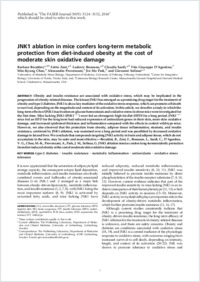JNK1 ablation in mice confers long-term metabolic protection from diet-induced obesity at the cost of moderate skin oxidative damage
- Becattini, Barbara Laboratory of Metabolic Stress Biology, Department of Medicine, University of Fribourg, Switzerland
- Zani, Fabio Laboratory of Metabolic Stress Biology, Department of Medicine, University of Fribourg, Switzerland
- Breasson, Ludovic Laboratory of Metabolic Stress Biology, Department of Medicine, University of Fribourg, Switzerland
- Sardi, Claudia Laboratory of Metabolic Stress Biology, Department of Medicine, University of Fribourg, Switzerland
- D'Agostino, Vito Giuseppe Center for Integrative Biology, University of Trento, Trento, Italy
- Choo, Min-Kyung Cutaneous Biology Research Center, Massachusetts General Hospital and Harvard Medical School, Charlestown, Massachusetts, USA
- Provenzani, Alessandro Center for Integrative Biology, University of Trento, Trento, Italy
- Park, Jin Mo Cutaneous Biology Research Center, Massachusetts General Hospital and Harvard Medical School, Charlestown, Massachusetts, USA
- Solinas, Giovanni Laboratory of Metabolic Stress Biology, Department of Medicine, University of Fribourg, Switzerland
-
09.01.2016
Published in:
- The FASEB Journal. - 2016, vol. 30, no. 9, p. 3124–3132
English
Obesity and insulin resistance are associated with oxidative stress, which may be implicated in the progression of obesity-related diseases. The kinase JNK1 has emerged as a promising drug target for the treatment of obesity and type 2 diabetes. JNK1 is also a key mediator of the oxidative stress response, which can promote cell death or survival, depending on the magnitude and context of its activation. In this article, we describe a study in which the long-term effects of JNK1 inactivation on glucose homeostasis and oxidative stress in obese mice were investigated for the first time. Mice lacking JNK1 (JNK1−/−) were fed an obesogenic high-fat diet (HFD) for a long period. JNK1−/− mice fed an HFD for the long term had reduced expression of antioxidant genes in their skin, more skin oxidative damage, and increased epidermal thickness and inflammation compared with the effects in control wild-type mice. However, we also observed that the protection from obesity, adipose tissue inflammation, steatosis, and insulin resistance, conferred by JNK1 ablation, was sustained over a long period and was paralleled by decreased oxidative damage in fat and liver. We conclude that compounds targeting JNK1 activity in brain and adipose tissue, which do not accumulate in the skin, may be safer and most effective.— Becattini, B., Zani, F., Breasson, L., Sardi, C., D’Agostino, V. G., Choo, M.-K., Provenzani, A., Park, J. M., Solinas, G. JNK1 ablation in mice confers long-term metabolic protection from diet-induced obesity at the cost of moderate skin oxidative damage.
- Faculty
- Faculté des sciences et de médecine
- Department
- Département de Médecine
- Language
-
- English
- Classification
- Biological sciences
- License
-
License undefined
- Identifiers
-
- RERO DOC 277703
- DOI 10.1096/fj.201600393R
- Persistent URL
- https://folia.unifr.ch/unifr/documents/305160
Statistics
Document views: 131
File downloads:
- Article + Supplemental material: 114
